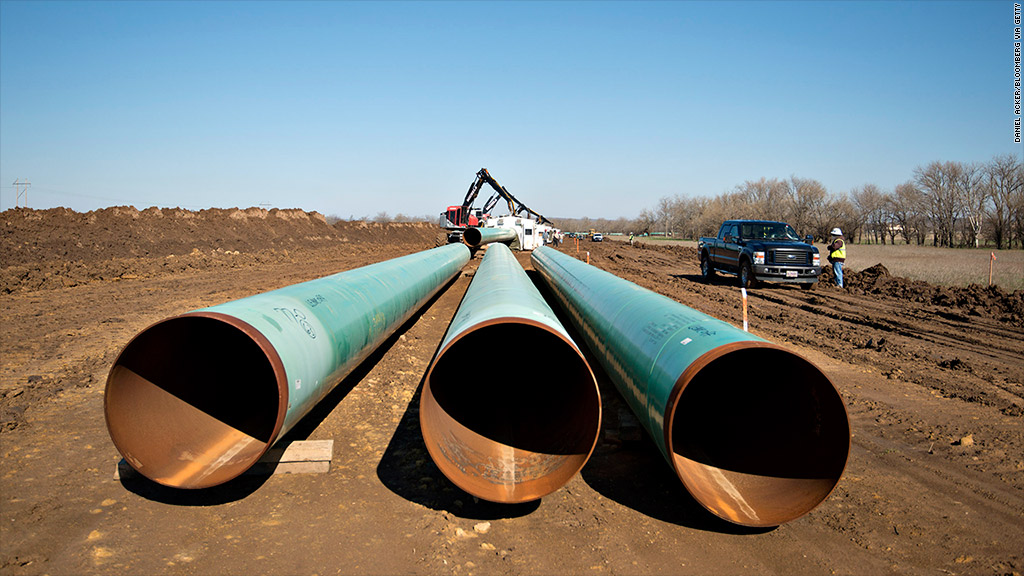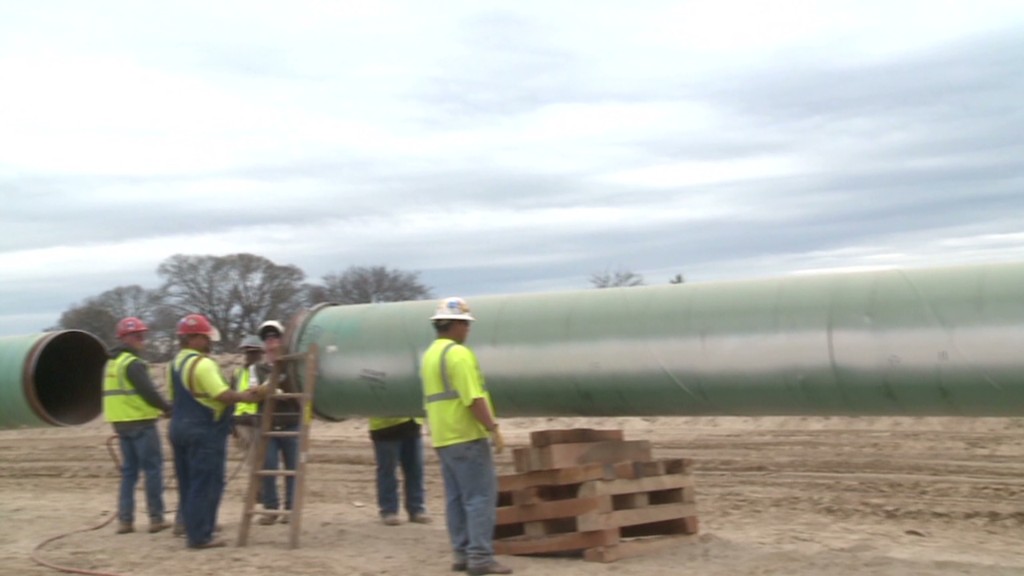
The latest delay to the Keystone XL pipeline is causing serious headaches for the management and investors of TransCanada (TRP), the controversial project's developer.
Shares of the Calgary-based company retreated over 3% on Monday, the first trading day since the U.S. State Department once again punted on whether or not to approve the $5.4 billion project.
Related: Keystone XL: Separating reality from rhetoric
"We are extremely disappointed and frustrated with yet another delay," TransCanada CEO Russ Girling said in a strongly-worded statement Monday morning.
"It is unfortunate that interest groups and paid activists are blocking energy security, saying no to jobs, and creating a situation that actually leads to higher GHG's (greenhouse gas emissions) and greater public risk," he said.
Canada's Chamber of Commerce estimates the country's economy is losing about C$50 million each day that Keystone or a similar pipeline is not approved.
Stock markets were closed Friday when the State Department announced the latest delay.
The State Department is extending the input period for federal agencies to examine the pipeline project because of the "potential impact" of a pending Nebraska Supreme Court case.
The battle in Nebraska's high court is over the legality of the approval process for the pipeline's route through the state. It may not be wrapped up until the end of the year or early 2015.
"It's another day of Kabuki Theater that we call energy development," said Sheila Hollis, a partner at Duane Morris specializing in energy policy and a former official at the Federal Energy Regulatory Commission. "I am concerned about dragging this out for so bloody long."
Related: Obama administration pushes back Keystone decision
While investors expressed concern about the latest delay, Morningstar believes TransCanada's Monday selloff is overdone.
"We are now more bullish on the name and view the decline as an excellent buying opportunity," said David McColl, an analyst at Morningstar who covers TransCanada.
Morningstar places a $48 fair value estimate on TransCanada, which traded as low as $44.78 during intraday trading on Monday.
McColl said one reason to buy TransCanada is the company's Energy East Project, which would transport oil from Alberta to Saint John, New Brunswick by converting part of a gas line into crude oil. The project would carry 1.1 million barrels of crude oil per day and the company targets a 2017 or 2018 opening date.
The Energy East Project does a great job of insulating TransCanada against even the cancellation of Keystone XL, McColl said.

Opponents of the Keystone XL pipeline fear the project will hurt the environment by encouraging development of Alberta's oil sands. Last week, former President Jimmy Carter joined nine other Nobel Peace Prize winners in a letter urging President Barack Obama reject Keystone for environmental reasons.
However, in January the State Department concluded the project is "unlikely to significantly impact the rate of extraction in the oil sands or the continued demand for heavy crude oil at refineries in the United States."
Hollis, who taught energy law for 25 years, said she believes "on balance the pipeline makes sense," especially because of America's close relationship with Canada.
The geopolitical backdrop has become more complicated since the Keystone pipeline was first announced in 2008, with revolutions creating turmoil in the Middle East, and Russia using Europe's energy needs for leverage in battles over Ukraine and Crimea.
Some observers believe politics at home will decide the ultimate fate of Keystone.
"It boils down to whether the project will be approved after the midterm election. That may very well be determined by the outcome of Congressional elections," said McColl.


